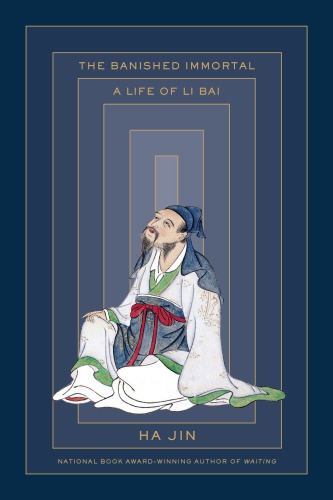
The Banished Immortal
A Life of Li Bai (Li Po)
کتاب های مرتبط
- اطلاعات
- نقد و بررسی
- دیدگاه کاربران
نقد و بررسی

August 1, 2018
My happy introduction to Li Bai (also called Li Po) was through a collection of Chinese poetry called The Jade Flute I received as a child. So I am truly anticipating this biography of the important eighth-century poet, written by National Book Award winner Ha Jin and ranging from the poet's Daoist beliefs to his early itinerant life to his mystery-shrouded death during a time of rebellion.
Copyright 2018 Library Journal, LLC Used with permission.

October 15, 2018
The National Book Award-winning Chinese-American novelist and poet sketches the life of one of his native country's foundational poets.Jin's (Creative Writing/Boston Univ.; The Boat Rocker, 2016, etc.) subject, Li Bai (701-762), better known to Western readers as Li Po, wrote about rural China with a melancholy grace; his work is suffused with long rivers ferrying travelers under watchful moons, leaving lovers and drinking partners behind. The creator of this poised and forceful (if somber) work was restless, constantly torn between wanting a secure government perch and wanting to abandon mainstream society entirely. The son of a merchant, he grew up in relative financial comfort, but because of a cultural distrust of businessmen, he found it nearly impossible to qualify for officialdom. Instead, he traveled, often for years at a time, all but abandoning his wife and children, writing poems that caught the attention of fellow poets like Du Fu and of royalty; for a time, he was a favorite of the Tang dynasty emperor. However, court life felt like a gilded cage, and his attempts at statecraft were dismissed as amateurish. Li Bai is an intriguing bundle of contradictions, but Jin seems to struggle with how to reconcile them. The author is a careful, deliberate stylist, which has made for finely understated novels and short stories. When writing nonfiction, though--especially regarding a subject like Li Bai, where accurate historical records are sparse--his writing becomes restrained, even wooden. Though Jin has accessed Chinese-language sources, his book is often frustratingly bereft of interpretive power or context. For example, the author barely examines the publishing industry (or word of mouth) that led to Li Bai's rising stardom but fusses over picayune squabbles about his behavior at court. Jin's fine translations of his subject's poems are blessedly abundant, but he resists delivering deep interpretations of them.Jin dutifully explores Li Bai's status as a major, high-spirited poet but with little of the vigor of his subject.
COPYRIGHT(2018) Kirkus Reviews, ALL RIGHTS RESERVED.

Starred review from October 22, 2018
Novelist Jin (Waiting) presents a taut introduction to the life and poetry of influential eighth century Daoist poet Li Bai (701–762 CE). Li, known also in the West as Li Po, devoted his life to seeking a position at court and attempted to flatter a range of officials in hopes of a recommendation. He traveled through China, drinking heavily and producing obsequious but artistically impressive poems, and though he gained a devoted following, his Daoist orientation clashed with the Confucian officials who could recommend him. After years of rebuffs, he achieved a position, only to leave shortly thereafter when it became clear the emperor would not meaningfully employ his talents and advice. Li then returned to an itinerant lifestyle and underwent the strenuous Daoist initiation rituals of extreme fasting at a mountain monastery. His travels, funded by wealthy patrons and his second wife’s family business, exposed him to the emperor’s military missteps, and he narrowly escaped execution after joining a coup. His politically motivated marriages receive skimpy attention due to limited sources and the fact that he spent much of his life away from family. Jin’s explanations of Li’s poetry will help readers unfamiliar with Chinese forms see the power and beauty of Li’s work, and the distinct Daoist influences that put him at odds with his Confucian contemporaries. Jin’s polished biography will give
a wider audience access to the politics and beauty of a major Chinese poet.

January 1, 2019
In Tang dynasty China, a poet could nurture high hopes. Becoming an imperial counselor exercising statecraft wasn't inconceivable, especially if, like Li Bai (701-62), who is also known in English as Li Po, one had studied swordsmanship and history as well as literature. Li Bai also claimed descent from Han dynasty emperors, as did the emperors of Bai's lifetime. He once wangled a court placement but in less than two years resigned, disappointed at being treated as a writer only, not necessarily of poems; he never became a made man. His life as distinguished poet and fiction writer Ha Jin (The Boat Rocker, 2016) so limpidly relays it was peripatetic rather than domestic, usually away from the family he strove to support. Yet he was an unstaunchable fount of poems of friendship, drinking, dancing, nostalgia, and regret and, what is unusual and particular to him, poems adopting the perspectives of others, including ordinary men and women. Li Bai still stands, with his friend Du Fu, at the pinnacle of Chinese poetry, and his influence is extensive the world over.(Reprinted with permission of Booklist, copyright 2019, American Library Association.)

























دیدگاه کاربران